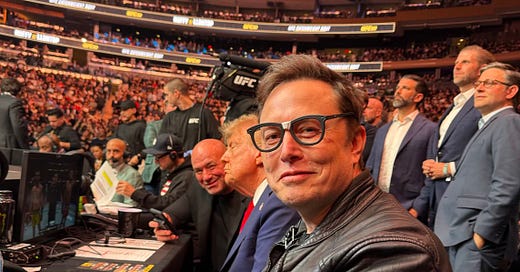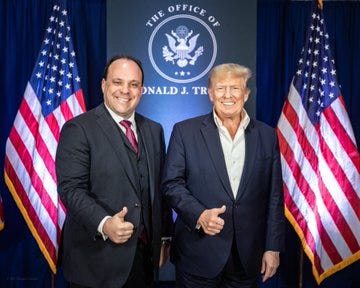The New Court Politics: Trump's Second Term Takes Shape Amid Internal Power Struggles
In the gilded halls of Mar-a-Lago, where the paint barely dried on Trump's 2024 victory celebration, a peculiar drama is unfolding that would make Machiavelli raise an eyebrow. The installation of Elon Musk as co-head of the satirically named
"Department of Government Efficiency" (DOGE) marks either a stroke of genius or an exercise in political dadaism – and possibly both.
The Art of the New Deal
The appointment itself reads like a headline from The Onion that accidentally landed in the Federal Register. Yet it perfectly encapsulates the emerging architecture of Trump's second term: a masterclass in political theater where Silicon Valley disruption meets Washington inertia, all orchestrated by a president who has turned government administration into performance art.
What's particularly telling isn't the reported "massive blowup" between Musk and longtime Trump confidant Boris Epshteyn (which transition sources now vehemently deny), but rather the structural realignment it represents. The old guard, represented by Epshteyn and his cohort, finds itself increasingly at odds with the new blood Trump is transfusing into his political operation.
The Chess Game Behind the Spectacle
The strategic appointments tell the real story. Matt Gaetz for Attorney General, William McGinley as White House counsel, and the elevation of Trump's defense lawyers Todd Blanche and Emil Bove to senior Justice Department positions – these aren't just appointments; they're declarations of intent. Each selection appears carefully calculated to merge loyalty with legal firepower, creating a justice system primed to execute Trump's vision of executive authority.
Meanwhile, Musk's growing influence – evidenced by his regular presence on Trump Force One and his careful cultivation of relationships with Tucker Carlson, VP-elect JD Vance, and even 17-year-old Kai Trump – suggests a sophisticated power play that extends beyond mere advisory roles. The Tesla CEO's public endorsement of Howard Lutnick for Treasury Secretary demonstrates either remarkable political naïveté or a shrewd understanding of how to weaponize public statements in internal power struggles.
The Historical Echo Chamber
We've seen this movie before, though perhaps never with such exotic casting. The tension between established courtiers and newfound favorites recalls nothing so much as the Tudor court, where proximity to the monarch translated directly into power. The difference is that instead of whispering in royal chambers, modern influence is measured in retweets and cable news appearances.
The consideration of Scott Bessent – a former Soros fund manager – for Treasury Secretary would have been unthinkable in Trump's first term. That it's even possible now suggests either a dramatic ideological flexibility or, more likely, a recognition that economic competence might need to trump political purity in a second term facing unprecedented challenges.
The Machinery Behind the Throne
What makes this particular power struggle fascinating isn't just its cast of characters, but its implications for governance. The "Department of Government Efficiency" may sound like a punchline, but it represents a serious attempt to retrofit the federal bureaucracy with a Silicon Valley mindset. Whether that's desirable – or even possible – remains to be seen, but it represents the most ambitious attempt to remake the executive branch since the New Deal.
The old hands "chafing" at Musk's constant presence aren't just protecting their turf; they're defending a particular vision of government that's increasingly at odds with the technocratic disruption Musk represents. The irony that this disruption is happening under Trump, who campaigned against technocratic expertise, seems lost on everyone involved.
Looking Forward Through the Rearview Mirror
As this administration takes shape, we're watching a fascinating experiment in governance: can the federal bureaucracy be run like a tech startup? Can Trump's populist base reconcile with Silicon Valley efficiency? The answers to these questions will shape not just this administration, but potentially redefine the relationship between government and technology for generations.
The reported dinner confrontation at Mar-a-Lago, whether it happened as described or not, represents more than just personal animosity. It's a microcosm of the larger tensions that will define this second Trump term: old guard versus new blood, traditional conservatism versus tech disruption, loyalty versus efficiency.
In the end, this might be remembered as the moment when American governance took a decisive turn – though whether toward innovation or chaos remains to be seen. As the administration continues to take shape, one thing is clear: we're watching the birth of a new political paradigm, one that defies traditional left-right categorization and might just redefine American governance for the 21st century.
Whether that's cause for celebration or concern may be the most important political question of our time.






